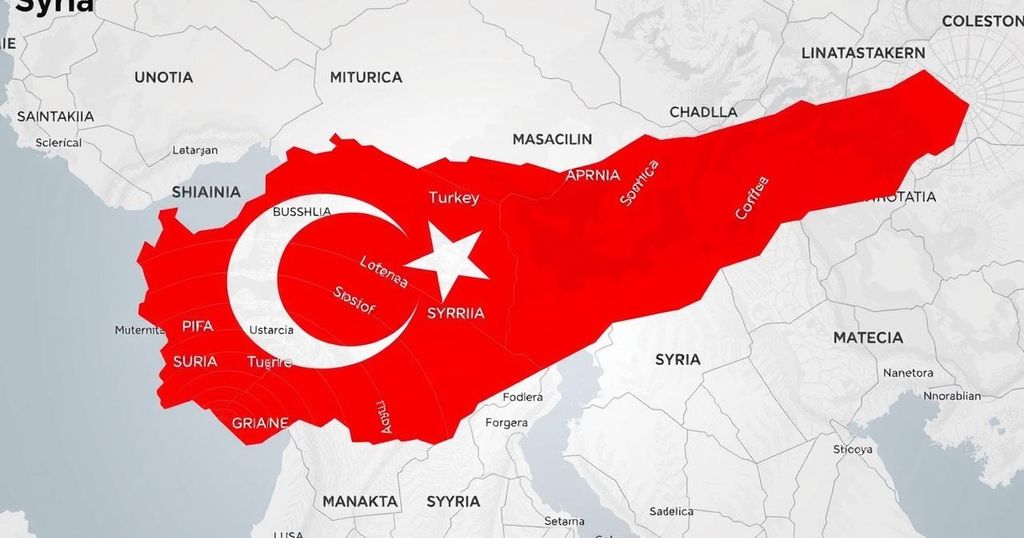Turkey’s Role in Syria: A Premature Claim to Victory
Turkey’s claim to victory in Syria following the fall of Assad is premature. Despite advantage through support of HTS and the Syrian National Army, President Erdogan faces substantial challenges. The dynamics involve complex relationships with various regional and international players, as well as the Kurdish issue, making it essential to approach claims of victory with caution.
Turkey’s aspirations in Syria, particularly in light of Bashar al-Assad’s recent political misfortunes, should not be prematurely celebrated as triumphs. Analysts and officials proclaim a Turkish victory following the fall of the Assad regime; however, Turkey has not definitively achieved a winning position yet. Despite favorable ground through its affiliations with Hayat Tahrir al-Sham (HTS) and the Syrian National Army, President Recep Tayyip Erdogan faces significant hurdles in consolidating influence in Damascus.
The assertion that Turkey has emerged victorious largely rests on its support for the militias responsible for Assad’s decline. Nevertheless, the intention behind Turkey’s involvement in Aleppo was primarily to leverage pressure for negotiations, not outright cessation of Assad’s rule. Only after military failures did Turkey shift its narrative, presenting itself as a fundamental victor in Assad’s downfall.
Moreover, despite Turkey’s proactive engagements, HTS and the Syrian National Army are now fully aware of their growing agency, presenting a challenge to Ankara’s once dominant role. In recent months, leaders from various nations, including the United States and the European Union, have sought connections with HTS leaders, enhancing their negotiating position independent of Turkish influence.
This shift signals that Turkey’s claims of cultural affinity and unparalleled insight into the Arab world may not hold weight against its competitors, who share closer historical and political ties with Syria. Additionally, relations with regional powers such as Saudi Arabia and Egypt could complicate Turkey’s narrative and weaken Ankara’s standing.
Turkey’s potential move against Kurdish forces, particularly the YPG, further complicates its post-Assad strategy. While Ankara perceives the changing landscape as an opportunity to consolidate power against Kurdish nationalism, the consequences of miscalculating this dynamic could lead to prolonged conflicts that strain Turkish resources.
Thus, the insistence that “Turkey won Syria” obscures the complex realities of regional geopolitics and underestimates the layered relationships between various actors in Syria. This narrative risks establishing unrealistic expectations which could lead to severe disappointments in the ongoing power struggle in the region. With a history of miscalculation in Syria since the onset of the civil conflict in 2011, it remains premature to declare Turkey as the unequivocal victor in these pivotal developments.
The conflict in Syria has drastically evolved since the civil war commenced in 2011. In recent months, with the apparent decline of President Bashar al-Assad’s power, analysts began to speculate on the implications for Turkey, a key regional player with vested interests in Syria. Turkey’s involvement has often centered on various groups opposing Assad and countering perceived threats from Kurdish national movements. The evolving dynamics among foreign powers in Syria complicate Turkey’s aspirations and influence, necessitating a deeper understanding of the nuances at play.
In conclusion, while Turkey’s presence in Syria has been strengthened following recent political shifts, it is misleading to prematurely label Ankara as the definitive victor. The intricacies of regional politics, the resilience of Syrian factions, and the historical missteps of Turkish policymakers suggest that the path ahead is fraught with challenges. Turkey must navigate a complex landscape and contend with various actors, both regional and domestic, that have significant stakes in Syria’s future. As such, it is essential to adopt a cautious perspective regarding the future of Turkey’s engagement in Syria.
Original Source: foreignpolicy.com




Post Comment